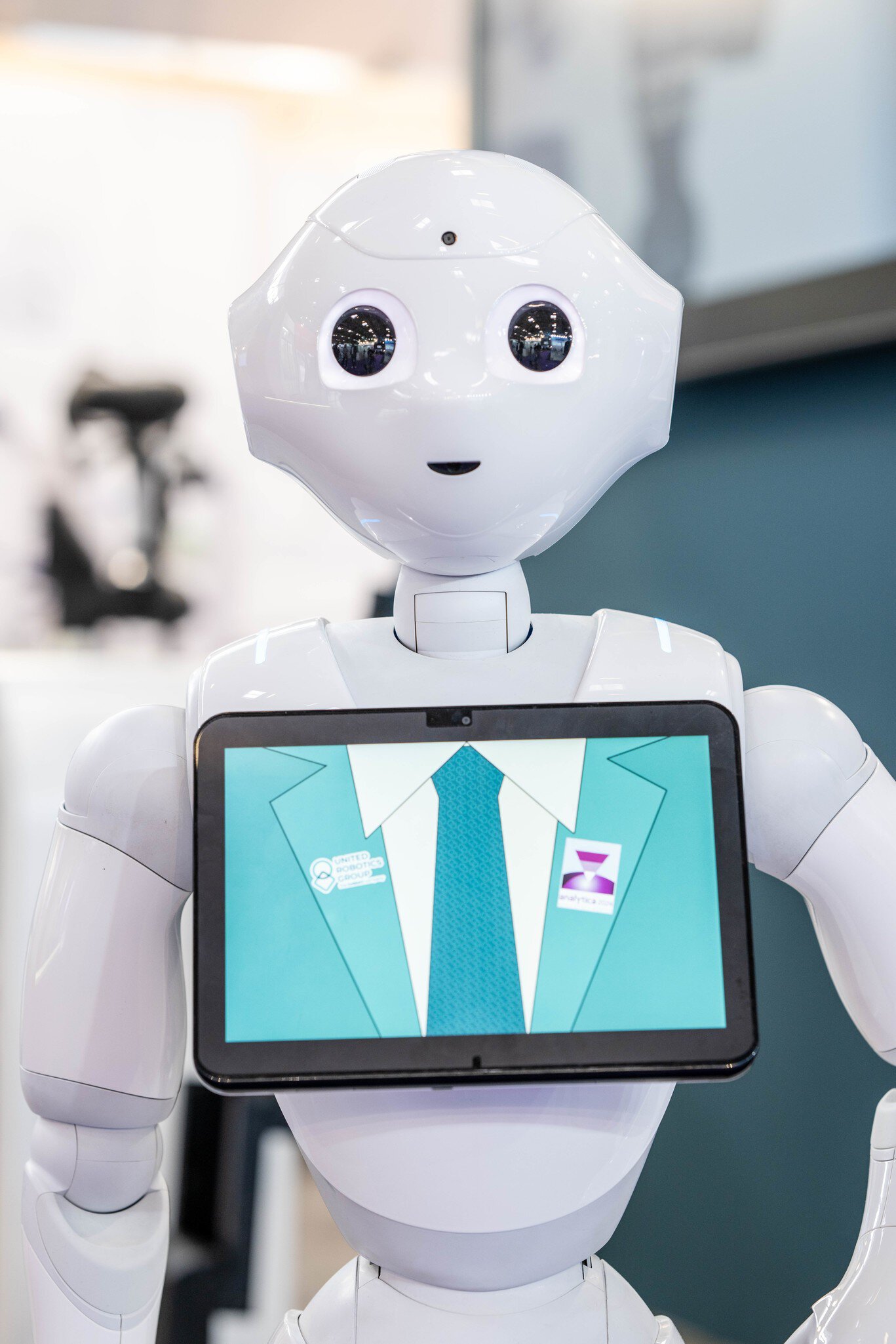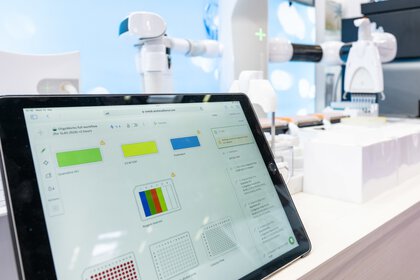Lab automation at analytica
The purpose of lab automation is to make work in the modern laboratory more efficient. But can laboratory automation be successful in the chemical, biological, pharmaceutical, medical or food sectors? At analytica, the leading trade show for laboratory technology, analysis and biotechnology, we will present the latest trends in automation technology and lab automation systems.
Laboratory automation - News & Trends
How artificial intelligence and machine learning make laboratory work more effective
In addition to digital transformation, there is a growing trend toward automation in laboratories. This involves automating all process steps, from sample preparation through the entire analysis chain to the final result, including data evaluation, data storage, and data security.
In Lab 4.0, artificial intelligence (AI) is increasingly being integrated into individual laboratory devices and laboratory processes. AI is a key driver of developments in analysis 4.0 and laboratory automation.
How can lab automation be successfully implemented?
Laboratory automation makes work in modern laboratories significantly more efficient, safer, and more sustainable. But how can laboratory automation be successfully implemented in the chemical, biological, pharmaceutical, medical, and food industries? The latest developments in laboratory automation will be on display at analytica, the world's leading trade fair for analysis, laboratory technology, and biotechnology in Munich. See for yourself the important innovations for the laboratory of tomorrow and the future trends in automation technology.
Digitized laboratory processes, networking of analytical instruments, and laboratory information management systems (LIMS) are already standard in industrial laboratories today. This has been made possible by innovative AI-supported automation solutions.

Reliable and transparent laboratory work with the help of:
- Automated sampling and sample feeding techniques,
- continuous analysis
- monitoring of measurement parameters,
- data evaluation, and
- digital data storage
This is particularly important for the universally demanded increase in laboratory efficiency, coupled with a growing shortage of skilled workers. With these increasing demands on laboratory staff in their daily work, the ever-more complex sample volumes can only be handled with the help of automated, AI-based laboratory solutions.
In addition to integrable, future-proof software and robotics tools, the prerequisites for functional networking are, above all, uniform device interfaces and transparent, validated processes and data flows, data integrity, and manufacturer-independent platforms for data exchange and automation.

Companies in the field of laboratory automation at analytica 2026
Find more companies which can support you with laboratory automation and lab automation systems in our exhibitor directory.
What are the benefits for users and laboratory operators?
- Early detection of sources of error and malfunctions: AI-supported laboratory automation detects potential errors and unexpected malfunctions at an early stage.
- Proactive measures: Automated interventions can resolve problems or even prevent them altogether.
- Error correction in the event of failures: If a failure or error does occur, it is automatically corrected or eliminated with appropriate measures.
- Increased process reliability: This makes laboratory processes safer, smarter, and more reliable.
- Location- and time-independent access: Laboratory staff and users can access analysis and laboratory equipment at any time and from anywhere via cell phone.
- Comprehensive control and monitoring: Processes can be controlled and monitored remotely, and necessary maintenance work can be initiated directly.
- Time savings for skilled workers: Highly qualified laboratory staff gain more time for their actual tasks, e.g., in research.
- Automation of time-consuming routine tasks: Many recurring and time-consuming tasks in everyday laboratory work are fully automated.
- Support from AI models: Various AI models ensure that processes run more securely, sustainably, and reliably.

Automated processes
Relevance and significance:
Efficient, optimally functioning liquid handling systems are now standard in working with biological samples. Reasons for this:
- Occupational safety
- Sample safety
With increasing AI-based automation, this area is developing into a growth field.
Areas of application:
Particularly relevant in personalized medicine and individualized cell therapies. Here, it is possible to:
- Automate time-consuming laboratory processes.
- Simplify workflows with the help of artificial intelligence (AI).
Advantages of standardization:
- Faster processing of a wide range of different substances.
- Shorter process times, lower costs, and higher quality results.

Individual solutions to your laboratory automation system
After determining the requirements for your laboratory, you will also know which laboratory equipment, facilities and software are needed to make your day-to-day work easier. Since individual solutions are often required, analytica, the leading trade show in this field, offers the perfect opportunity to make contacts with companies in the field of laboratory automation. So visit us in Munich and discover the latest trends in laboratory automation.
Be there now and secure your ticket for analytica!
With just a few clicks you can buy your personal ticket to analytica or redeem a voucher.
FAQs on lab automation
The first steps in laboratory automation were actually taken in the 1970s in the chemical industry, where processes such as stirring or temperature control were to be taken over by machines. Lab automation is basically about letting equipment, robotics or software take over processes in the lab as far as possible, for example, in order to free up laboratory staff for other important tasks:
- free up lab staff time for other important work steps,
- save costs or
- increase reproducibility through machine accuracy.
Laboratory automation is thus a subarea of automation technology. The goal here is for the machines to work more and more independently and to eliminate the need for human intervention.
Lab Automation can support you in many areas, for example:
- Measurements using sensors or analyzers
- Carrying out experiments, e.g. using robotics
- Documentation, e.g. of the laboratory journal
- Evaluation with the help of a database
- To make routine tasks easier for laboratory staff and free up time for other important work steps
- Increased efficiency and productivity
- Reproducibility through machine accuracy
- Improved quality
- Increased laboratory safety and data security
- Cost savings and increased sustainability
- Increasing reproducibility through machine accuracy.
Miniaturization
Miniaturization of processes plays a role in meeting efficiency requirements and in handling expensive and valuable sample material or toxic substances. In the life sciences and personalized medicine, key technologies such as single-cell analysis are used, which would not be feasible without laboratory automation given the large number of samples and the resulting data volumes. AI-based device systems are a prerequisite for next-generation sequencing.






